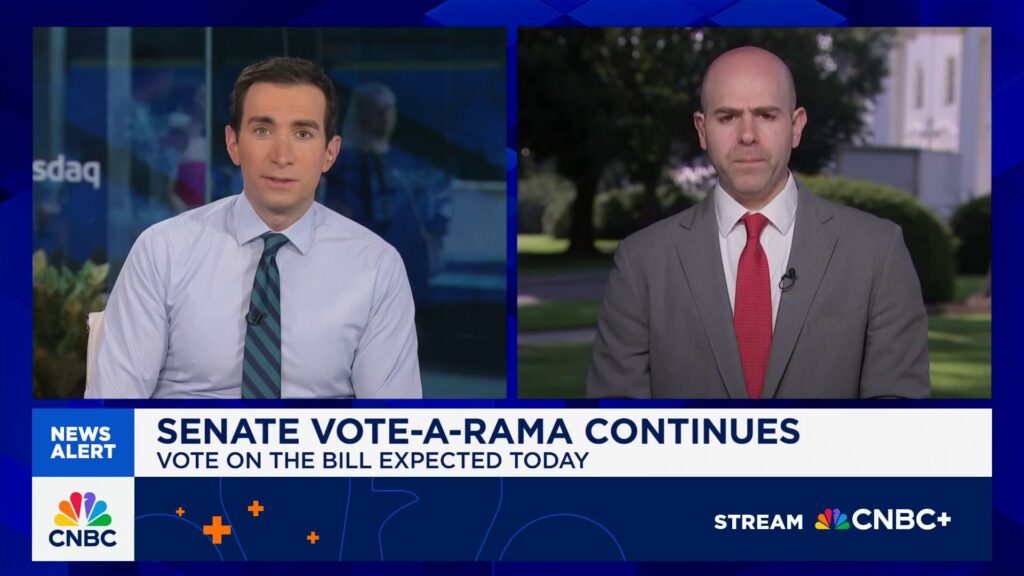White House Council of Economic Advisers Chairman Stephen Miran expressed confidence in advancing President Trump’s tax and spending bill during a recent appearance on CNBC’s ‘Squawk Box’. Miran’s remarks come at a critical juncture as the administration faces mounting pressure to address fiscal deficits and ongoing U.S. trade negotiations.
In an interview, Miran emphasized the administration’s commitment to enacting the proposed tax reforms, which aim to stimulate economic growth and increase competitiveness. “We’re going to get President Trump’s tax bill over the line,” Miran stated, underscoring the administration’s determination to push the legislation through despite potential hurdles.
Economic Context and Challenges
The announcement comes as the U.S. grapples with a complex economic landscape. The proposed tax bill, which seeks to overhaul the current tax structure, is part of a broader strategy to invigorate the economy. However, concerns about the national deficit and the implications of increased spending have sparked debate among policymakers and economists.
According to sources familiar with the matter, the administration is working to balance tax cuts with fiscal responsibility. This delicate equilibrium is crucial as the U.S. navigates its economic recovery post-pandemic, with inflation and supply chain disruptions still posing significant challenges.
Deficit Concerns and Fiscal Responsibility
One of the primary criticisms of the tax bill revolves around its potential impact on the national deficit. Critics argue that while tax cuts may spur short-term growth, they could exacerbate the deficit in the long run. Miran, however, contends that the economic benefits will outweigh the costs.
“The goal is to create a more dynamic economy that generates higher revenue in the future,” Miran explained. “We believe that responsible tax policy can coexist with fiscal prudence.”
This perspective aligns with historical instances where tax reforms have been used as a tool for economic stimulation. The Reagan administration’s tax cuts in the 1980s, for example, are often cited as a precedent, though opinions on their long-term efficacy remain divided.
Trade Negotiations and Economic Strategy
Meanwhile, the administration’s focus is not solely on domestic policy. U.S. trade negotiations are a crucial component of the broader economic strategy. Miran highlighted ongoing discussions with key trading partners, aiming to secure favorable terms that would benefit American industries and workers.
Trade policy experts suggest that successful negotiations could bolster the administration’s economic agenda by opening new markets and reducing trade barriers. However, these efforts must be carefully coordinated with domestic policy to ensure a cohesive economic strategy.
Expert Opinions and Market Reactions
Economists and market analysts are closely watching the developments. While some express optimism about the potential for economic growth, others caution that the risks associated with increased deficits and trade tensions could undermine these efforts.
“The interplay between tax policy and trade negotiations is complex,” noted Dr. Lisa Harris, an economist at the Brookings Institution. “Success in one area does not guarantee overall economic stability.”
Market reactions have been mixed, with investors weighing the prospects of tax cuts against the uncertainties of trade outcomes. The stock market has shown volatility in response to these dynamics, reflecting the broader economic uncertainties.
Looking Ahead: Implications and Next Steps
The move represents a significant step in the administration’s economic agenda. As lawmakers prepare to debate the tax bill, its passage will likely hinge on bipartisan support and the ability to address deficit concerns effectively.
The coming weeks will be critical as negotiations continue both domestically and internationally. The administration’s ability to navigate these challenges will play a crucial role in shaping the economic landscape for years to come.
In conclusion, while the path forward is fraught with challenges, the administration’s commitment to its economic objectives remains steadfast. The outcome of these efforts will have lasting implications for the U.S. economy and its position on the global stage.
